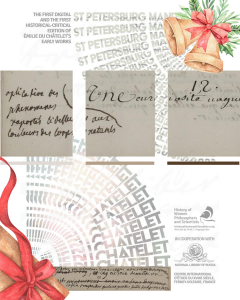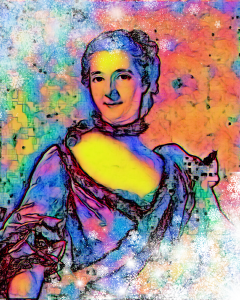One of our three main research clusters at the Center for the History of Women Philosophers and Scientists is the study of Émilie du Châtelet (1706-1749). In fact, we have two major projects to digitise her works. One is focused on manuscripts held in Saint Petersburg, the other on manuscripts from Paris.
The Saint Petersburg Manuscripts
 Émilie Du Châtelet’s early writings (early 1730s to early 1740s), including her translation of Mandeville’s Fable of the Bees, are preserved in the Voltaire Collection of the National Library of Russia in St Petersburg (NLR). Many of the texts from this period were completed but never published. Some of these early works by Du Châtelet have been wrongly attributed to Voltaire, although the text itself is proven to have been written by Du Châtelet. These writings cover a wide range of philosophical topics, and are of great value both for Du Châtelet’s intellectual career and for the history of the European Enlightenment in the early 18th century. They are documents of great relevance to the emergence and development of her later epistemological positions within the key metaphysical controversies of her epoch.
Émilie Du Châtelet’s early writings (early 1730s to early 1740s), including her translation of Mandeville’s Fable of the Bees, are preserved in the Voltaire Collection of the National Library of Russia in St Petersburg (NLR). Many of the texts from this period were completed but never published. Some of these early works by Du Châtelet have been wrongly attributed to Voltaire, although the text itself is proven to have been written by Du Châtelet. These writings cover a wide range of philosophical topics, and are of great value both for Du Châtelet’s intellectual career and for the history of the European Enlightenment in the early 18th century. They are documents of great relevance to the emergence and development of her later epistemological positions within the key metaphysical controversies of her epoch.
The project on the Saint Petersburg manuscripts is a collaboration between the Centre for the History of Women Philosophers and Scientists and the National Library of Russia, St Petersburg. The edition of these manuscripts is the first institutionalised international cooperation project in the field of Du Châtelet edition and research; it is also the first historical-critical edition project at the Center and the first digital edition project in the field of Classical Humanities at the University of Paderborn.
The digitisation and online presentation of the manuscripts was carried out by the NLR. The transcriptions, critical apparatus, annotations and indexes were carried out by the Center for the History of Women Philosophers and Scientists, University of Paderborn, Germany, and Dr. Ulla Kölving and Andrew Brown of the Centre international d’étude du XVIIIe siècle, Ferney-Voltaire, France. Five of the texts, including the important translation of the Fable of the Bees, have already been uploaded in a reader-friendly online presentation between 2020 and 2023. The aim for the very near future is to put online–and also publish in print–the translations of these texts made in collaboration with some major scholars working on Du Châtelet.
The Paris Manuscripts
 It is widely agreed that in her Institutions de Physique, Du Châtelet innovatively combines metaphysics and physics, creating a work that is not merely a textbook on natural philosophy, but makes important contributions to the philosophy of science, metaphysics, and epistemology. Moreover, the considerable influence of this work on later Enlightenment thinkers, both in France and abroad, is well documented. Extensive manuscripts of this important manuscript are held at the Bibliothèque nationale de France in Paris, but until now there has been no standard, let alone critical, edition of the Institutions. The Center for the History of Women Philosophers and Scientists, with the support of funding from the Deutsche Forschungsgemeinschaft, is publishing a historical-critical edition of the work online. This is the first complete modern edition of the work and the first critical edition. The edition, which has so far published ten chapters, makes early and alternative versions of this important text freely available to the public. It allows for comparison among these versions, and also between these drafts and the two published versions of the Institutions. In early 2024, the Center team will add a historical commentary that (for example) explains citations and references in the text–stay tuned for more information!
It is widely agreed that in her Institutions de Physique, Du Châtelet innovatively combines metaphysics and physics, creating a work that is not merely a textbook on natural philosophy, but makes important contributions to the philosophy of science, metaphysics, and epistemology. Moreover, the considerable influence of this work on later Enlightenment thinkers, both in France and abroad, is well documented. Extensive manuscripts of this important manuscript are held at the Bibliothèque nationale de France in Paris, but until now there has been no standard, let alone critical, edition of the Institutions. The Center for the History of Women Philosophers and Scientists, with the support of funding from the Deutsche Forschungsgemeinschaft, is publishing a historical-critical edition of the work online. This is the first complete modern edition of the work and the first critical edition. The edition, which has so far published ten chapters, makes early and alternative versions of this important text freely available to the public. It allows for comparison among these versions, and also between these drafts and the two published versions of the Institutions. In early 2024, the Center team will add a historical commentary that (for example) explains citations and references in the text–stay tuned for more information!
In 2023, the researchers on Émilie Du Châtelet delivered some new work on her philosophy: On the 9th of May 2023, Dr. Jil Muller gave a talk in at the Christian-Albrechts-University in Kiel on “Émilie Du Châtelet und René Descartes: Legitimierung einer Erfahrungs- und Wissenstheorie” at the workshop Macht der Gewohnheit, Macht des Schreibens.
Aaron Wells and Ruth Hagengruber co-organized an international workshop on Du Châtelet, held at Paderborn University in February 2023, papers from which will be published in a volume in preparation with Springer. Wells and Jeff McDonough organized an international talk series on Du Châtelet–part of the Harvard University Seminar in History of Philosophy–hosted at Paderborn University in spring 2023. Two articles by Wells on Du Châtelet were published in 2023: “Science and the Principle of Sufficient Reason: Du Châtelet contra Wolff,” (HOPOS) and “‘In Nature as in Geometry’: Du Châtelet and the Post-Newtonian Debate on the Physical Significance of Mathematical Objects” (Between Leibniz, Newton, and Kant, Springer Boston Studies in the Philosophy of Science, ed. Wolfgang Lefèvre). He also completed the soon-to-be-published “Women in Early Modern Science: Du Châtelet and the Bologna Academy,” in The History and Philosophy of Science, 1450 to 1750, edited by Marius Stan (Bloomsbury). Wells gave five talks on Du Châtelet in 2023. In April, he gave an invited talk at Loyola University Chicago on “The Principle of Sufficient Reason in Early Modern Philosophy of Science: Leibniz, Du Châtelet, and Euler” (the paper will appear in The Principle of Sufficient Reason: A History, edited by Fatema Amijee and Michael Della Rocca (Oxford Philosophical Concepts series, Oxford University Press)). In May, he gave an invited plenary talk on “Du Châtelet on Newton’s Rules for Reasoning in Natural Philosophy” at the TEMPO Conference, Washington University in St. Louis; a talk on “Du Châtelet and Mathematical Necessity” at the Berlin-Hamburg Workshop in Early Modern Philosophy, Universität Hamburg (full paper forthcoming in The Bloomsbury Handbook of Du Châtelet, edited by Fatema Amijee); and an invited talk on “Du Châtelet on Newton’s Rules for Reasoning in Natural Philosophy” at the University of Groningen. Finally, in June 2023, Wells gave a talk at the PROTEUS seminar at the University of Milan “La Statale,” on “Arguments for the Continuity of Matter in Kant and Du Châtelet.”
If you want to find out more about these projects, the researchers involved, and their contributions, visit our webpage.
You cannot copy content of this page








